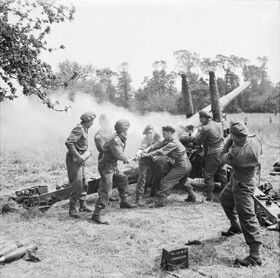Tyrrhenian Plateau Offensive: Difference between revisions
(Created page with "{{Infobox military conflict |conflict = Tyrrhenian Plateau Offensive |partof = the Scandivanian Campaign of the Second Europan War |image= File:ErebonianBatteryinTyr...") |
No edit summary |
||
| Line 43: | Line 43: | ||
* {{flagicon image|East europan imperial alliance 11666.jpg|22px}} [[Wolf Kocher]] <br/> | * {{flagicon image|East europan imperial alliance 11666.jpg|22px}} [[Wolf Kocher]] <br/> | ||
* {{flagicon image|East europan imperial alliance 11666.jpg|22px}} [[Johannes Schmetterling]]<br/> | * {{flagicon image|East europan imperial alliance 11666.jpg|22px}} [[Johannes Schmetterling]]<br/> | ||
* {{flagicon image|Archadia-archedes 931556.jpg |22px}} [[Pietro Romano]]<br/> | |||
* {{flagicon image|Archadia-archedes 931556.jpg |22px}} [[Armando di Costa]]<br/> | |||
}} | }} | ||
Revision as of 08:02, 10 April 2020
| Tyrrhenian Plateau Offensive | |||||||
|---|---|---|---|---|---|---|---|
| Part of the Scandivanian Campaign of the Second Europan War | |||||||
 A 5.5 inch gun manned by troops of the 12th Erebonian Artillery Regiment firing on Imperial positions | |||||||
| |||||||
| Belligerents | |||||||
| Commanders and leaders | |||||||
| Strength | |||||||
| 75,000 | 120,000 | ||||||
| Casualties and losses | |||||||
|
Approx. 10,500 55 tanks |
At least 20,000 70 tanks | ||||||
The Tyrrhenian Plateau Offensive (30 August 1941 - 31 September 1941) was an offensive launched by the Imperial forces in an attempt to capture the Heimdallr Capital Province and Heimdallr itself by autumn or before Winter. The plan came largely from Emperor Maximillian I in order to attempt to end the war in Scandinavia before the end of 1941. Nearly half of the plateau region fell under by 2 September 1941. However, Stubborn resistance by the allies gave Field Marshal Sir Daidoji Kitagawa time to prepare and launch a counterattack by 7 September. Reinforcements from Western Erebonia arrived to aid the Allies in pushing the Imperials back to the border.
No longer being able to mount sufficient forces, Field Marshal Petrus Nägelein ordered a retreat in 27 September 1941. The last of the Imperial resistance surrendered by the 31st September. Another offensive was launched by Marshal Nägelein, this time through the East with support from the Calvardian Forces in the 15 January Offensive of 1942.